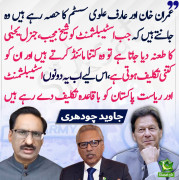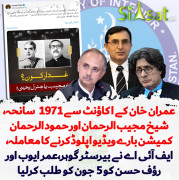You are using an out of date browser. It may not display this or other websites correctly.
You should upgrade or use an alternative browser.
You should upgrade or use an alternative browser.
Zia-ul-Haq
- Thread starter furry87
- Start date
abbasiali said:Here comes the cat out of bag,
Who is taking personal me and you. lol
no idea what cat ur talking about, ahem comprehension problem...I didnt take anything personal but u were certainly talking like u got offended lol read ur comments again.
You are right my reflexes are very slow, and it takes a while to pick from scholars or muftis like you(lol) but why my replies makes you uncomfortable, thats something really unbelievable.
Lol just because i reply does not mean i am uncomfortable, i do not understand that logic
Again I will advise you, if you can't compete, then don't poke your nose. and keep on doing the normal way, the way others do.
well first of all this is not at all about competing atleast for me , second i have been replying where i can not to win or lose but where i feel i should or can...and right now according to you music is haram , and this whole forum is indugled in haram activities apart from taul.
Its better for you to leave this subject as is, because I have a strong believe don't argue with those who couldn't differentiate between right and wrong.
lol okay buddy
How ever get ready to get answer for any retaliation.
.
A
abbasiali
Guest
Good you wake up finally, My apology, what ever the way you feel, but its all fine, I take your accusations and hopefully, you will be happy with that, enjoy your stay in our forum, However if you like to learn more about music, do keep reading ongoing threads in this regard,furry87 said:abbasiali said:Here comes the cat out of bag,
Who is taking personal me and you. lol
no idea what cat ur talking about, ahem comprehension problem...I didnt take anything personal but u were certainly talking like u got offended lol read ur comments again.
You are right my reflexes are very slow, and it takes a while to pick from scholars or muftis like you(lol) but why my replies makes you uncomfortable, thats something really unbelievable.
Lol just because i reply does not mean i am uncomfortable, i do not understand that logic
Again I will advise you, if you can't compete, then don't poke your nose. and keep on doing the normal way, the way others do.
well first of all this is not at all about competing atleast for me , second i have been replying where i can not to win or lose but where i feel i should or can...and right now according to you music is haram , and this whole forum is indugled in haram activities apart from taul.
Its better for you to leave this subject as is, because I have a strong believe don't argue with those who couldn't differentiate between right and wrong.
lol okay buddy
How ever get ready to get answer for any retaliation.
.
alihbkable
MPA (400+ posts)
This is also borne out by the Ahadith. The traditions of the Holy Prophet (saw). Rabi', the daughter of Mu'awwiz ibn 'Afra, said that the Holy Prophet (saw) came to me on the day of my wedding and seated himself on my bed just like other kith and kin. So our Ansar sisters began to play on 'Daf' (musical instrument) and sing in praises of martyrs of Badr. When one of the girls began singing in praise of the Holy Prophet (saw) he stopped her and asked to carry on singing as before.
A'isha Siddiqa narrates that a woman was married to an Ansari man. The Prophet (saw) intervening inquired of the women gathered there whether any of them knew anything of any sport or music.
A'isha Siddiqa narrates that the Holy Prophet (saw) said:
Let this 'Nikah' ceremony be pronounced loudly on 'Daf' and be held within the premises of mosque.
Playing of 'Daf' (musical instrument) and singing make difference of halal (lawful) and haram (forbidden) with regard to the legality of Nikah by publicizing it openly. Muhammad bin Hatim narrates that the Holy Prophet (saw) said:
The 'halal' is the state of lawfulness of 'Nikah' by openly publicizing it with 'Daf' and singing songs (while haram means doing it secretly and stealthily).
There are people with little knowledge of Shariah who erroneously arrange 'Nikah' silently without producing sound of 'Daf' or songs and they consider it a virtuous act. This is wrong. Virtue lies in obeying the Sunnah of the Holy Prophet (saw) observing complete silence on the occasion of marriage and rejoicing not only negates the Sunnah but it also tantamount to violation of the Sunnah as the Holy Prophet (saw) has made it a distinction between the lawful wedding and adultery.
A'isha Siddiqa narrates that a woman was married to an Ansari man. The Prophet (saw) intervening inquired of the women gathered there whether any of them knew anything of any sport or music.
A'isha Siddiqa narrates that the Holy Prophet (saw) said:
Let this 'Nikah' ceremony be pronounced loudly on 'Daf' and be held within the premises of mosque.
Playing of 'Daf' (musical instrument) and singing make difference of halal (lawful) and haram (forbidden) with regard to the legality of Nikah by publicizing it openly. Muhammad bin Hatim narrates that the Holy Prophet (saw) said:
The 'halal' is the state of lawfulness of 'Nikah' by openly publicizing it with 'Daf' and singing songs (while haram means doing it secretly and stealthily).
There are people with little knowledge of Shariah who erroneously arrange 'Nikah' silently without producing sound of 'Daf' or songs and they consider it a virtuous act. This is wrong. Virtue lies in obeying the Sunnah of the Holy Prophet (saw) observing complete silence on the occasion of marriage and rejoicing not only negates the Sunnah but it also tantamount to violation of the Sunnah as the Holy Prophet (saw) has made it a distinction between the lawful wedding and adultery.
alihbkable
MPA (400+ posts)
The point underlying this provision is abundantly clear that the act of marriage should be publicized so as to let the people know that the man and woman with each other are husband and wife. This purpose is best served by singing songs and playing musical instruments as per practice in vogue. Moreover expressing joy and making merry on such occasions are natural display of pleasure.
A'isha says:
I had an Ansari girl with me. I arranged her marriage. The Holy Prophet (saw) came and asked: "O A'isha! Why is there no song? This Ansari tribe has liking for singing songs on this occasion."
Ibn 'Abbas narrates the tradition that A'isha made arrangement of marriage of one of the Ansari girls related to her. The Holy Prophet (saw) came on that occasion and said: "Have you prepared the bride?" She replied in the positive and he further asked, "whether any singing girl has also been sent along to celebrate the wedding." A'isha replied in negative. At this the Holy Prophet (saw) remarks: "The Ansar people have special liking for songs. You had better send a singing girl to say that we have here come to you and may Allah grant you and us with long life. Practice of the Companions."
Aamir bin Sa'd says:
On a wedding occasion I happened to be with Qarza bin Ka'b and Abu Mas'ud Ansari and saw a party of singing girls there engaged in songs. I addressed the Ansar Companions saying: "O Companions of the Prophet, and warriors of Badr! What is this going on before you?" They replied: "This is all right if you are interested stay and listen to and if not you can leave from here as permission has been give us to sing and make merry on wedding occasions.
A'isha says:
I had an Ansari girl with me. I arranged her marriage. The Holy Prophet (saw) came and asked: "O A'isha! Why is there no song? This Ansari tribe has liking for singing songs on this occasion."
Ibn 'Abbas narrates the tradition that A'isha made arrangement of marriage of one of the Ansari girls related to her. The Holy Prophet (saw) came on that occasion and said: "Have you prepared the bride?" She replied in the positive and he further asked, "whether any singing girl has also been sent along to celebrate the wedding." A'isha replied in negative. At this the Holy Prophet (saw) remarks: "The Ansar people have special liking for songs. You had better send a singing girl to say that we have here come to you and may Allah grant you and us with long life. Practice of the Companions."
Aamir bin Sa'd says:
On a wedding occasion I happened to be with Qarza bin Ka'b and Abu Mas'ud Ansari and saw a party of singing girls there engaged in songs. I addressed the Ansar Companions saying: "O Companions of the Prophet, and warriors of Badr! What is this going on before you?" They replied: "This is all right if you are interested stay and listen to and if not you can leave from here as permission has been give us to sing and make merry on wedding occasions.
alihbkable
MPA (400+ posts)
Another Hadith is attributed to A'isha. She says:
Allah's Apostle came to my house while two girls were singing beside me the songs of Bu'ath (a story about the war between the two tribes of the Ansar, i.e. Khazraj and Aus, before Islam.) The Prophet reclined on the bed and turned his face to the other side. Abu Bakr came and scolded me and said protestingly, "Instrument of Satan in the presence of Allah's Apostle?" Allah's Apostle turned his face towards him and said, "Leave them." When Abu Bakr became inattentive, I waved the two girls to go away and they left. It was the day of 'Id when negroes used to play with leather shields and spears. Either I requested Allah's Messenger or he himself asked me whether I would like to see the display. I replied in the affirmative. Then he let me stand behind him and my cheek was touching his cheek and he was saying, "Carry on, O Bani Arfida (i.e. negroes)!" When I got tired, he asked me if that was enough. I replied in the affirmative and he told me to leave.
Allah's Apostle came to my house while two girls were singing beside me the songs of Bu'ath (a story about the war between the two tribes of the Ansar, i.e. Khazraj and Aus, before Islam.) The Prophet reclined on the bed and turned his face to the other side. Abu Bakr came and scolded me and said protestingly, "Instrument of Satan in the presence of Allah's Apostle?" Allah's Apostle turned his face towards him and said, "Leave them." When Abu Bakr became inattentive, I waved the two girls to go away and they left. It was the day of 'Id when negroes used to play with leather shields and spears. Either I requested Allah's Messenger or he himself asked me whether I would like to see the display. I replied in the affirmative. Then he let me stand behind him and my cheek was touching his cheek and he was saying, "Carry on, O Bani Arfida (i.e. negroes)!" When I got tired, he asked me if that was enough. I replied in the affirmative and he told me to leave.
alihbkable
MPA (400+ posts)
Conclusion
In the light of Quranic injunctions and the sayings of the Holy Prophet (saw), it is amply clear that singing good songs, reciting healthy poetry, playing musical instruments and beating drums on the occasions of marriage and rejoicings over happy festivals do not contravene the Islamic injunctions and this has been the Sunnah of the Holy Prophet (saw) and the practice of the Companions all along. This is all but natural outburst of joy and gives genuine opportunities of making outlets of their joys and pleasure. This is also the cultural need of the people with sorrows and afflictions. Everything that according to Quran and Sunnah is commendable needs no further justification to validate the expression of legitimate feelings of joy on the part of the people.
However, some precautions and constraints must be observed positively. The excess of the limits of propriety should not be allowed and case be taken that vulgar and obscene practices are not indulged in and mixed gathering of man and woman be avoided on such occasion. Islam teaches morality and practice of moderation and balance tempered by good and virtuous acts on all occasions.
In the light of Quranic injunctions and the sayings of the Holy Prophet (saw), it is amply clear that singing good songs, reciting healthy poetry, playing musical instruments and beating drums on the occasions of marriage and rejoicings over happy festivals do not contravene the Islamic injunctions and this has been the Sunnah of the Holy Prophet (saw) and the practice of the Companions all along. This is all but natural outburst of joy and gives genuine opportunities of making outlets of their joys and pleasure. This is also the cultural need of the people with sorrows and afflictions. Everything that according to Quran and Sunnah is commendable needs no further justification to validate the expression of legitimate feelings of joy on the part of the people.
However, some precautions and constraints must be observed positively. The excess of the limits of propriety should not be allowed and case be taken that vulgar and obscene practices are not indulged in and mixed gathering of man and woman be avoided on such occasion. Islam teaches morality and practice of moderation and balance tempered by good and virtuous acts on all occasions.
taul
Siasat.pk - Blogger
alihbkable said:Conclusion
In the light of Quranic injunctions
--Brother yet again where did you even come to conclusion in the context of The Holy Quran????Would you mind sharing some Ayaats!!
alihbkable
MPA (400+ posts)
where does Quran prohibit rejoicing Sir?taul said:alihbkable said:Conclusion
In the light of Quranic injunctions
--Brother yet again where did you even come to conclusion in the context of The Holy Quran????Would you mind sharing some Ayaats!!
taul
Siasat.pk - Blogger
alihbkable said:where does Quran prohibit rejoicing Sir?
--Brother,first as to why would you get yourself confused with jovial mood being interconnected with the music only??Secondly by thrusting your assumptions into The Holy and Divine Scripture you're committing a very grave sin,we need to be extremely cautious while addressing or relating anything with The Holy Qura'n.
A
abbasiali
Guest
Dear Taul,taul said:alihbkable said:where does Quran prohibit rejoicing Sir?
--Brother,first as to why would you get yourself confused with jovial mood being interconnected with the music only??Secondly by thrusting your assumptions into The Holy and Divine Scripture you're committing a very grave sin,we need to be extremely cautious while addressing or relating anything with The Holy Qura'n.
Would you suggest me to merge this post into Music and Islam.
AH
GeoG
Chief Minister (5k+ posts)
taul said:alihbkable said:where does Quran prohibit rejoicing Sir?
--Brother,first as to why would you get yourself confused with jovial mood being interconnected with the music only??Secondly by thrusting your assumptions into The Holy and Divine Scripture you're committing a very grave sin,we need to be extremely cautious while addressing or relating anything with The Holy Qura'n.
Brother Taul, I agree with your point of assumptions but music can be one of the source of jovial mood, be it not the only one!, so question begs your response for our knowledge. Regards.
taul
Siasat.pk - Blogger
GeoG said:Brother Taul, I agree with your point of assumptions but music can be one of the source of jovial mood, be it not the only one!, so question begs your response for our knowledge. Regards.
--Brother GeoG,the issue arises when linking such emotional impulses with the source of music are rendered justified by the religion,above all misrepresenting and inappropriately concluding from The Holy Qura'n.
--Feeling of happiness and rejoice can surely be triggered by the presence of music but in no way make music mandatory or a pre-requisite for being elated or in any state of rejoicing.
we need to be extremely cautious while addressing or relating anything with The Holy Qura'n.
Absolutely and 100 percent correct. Unfortunately it had/has been and continues to be a pure and mere cosmetic way of starting any thing with the help of Quranic verses, then perforce to make a connection of the "objective" with those verses. The reason being that believers do not understand Quran but read it as for "reading" only and hear it through some melodious voice. That is general tendency and interestingly or sadly this is the case with this Divine Book only, otherwise all other material even newspaper we read with correct understanding.
alihbkable
MPA (400+ posts)
guyz! my point is simple and precise and that is we can enjoy our good times and there is nothing wrong with the music when a person is rejoicing.
I agree to the point that listening to music is not good for health, but it is when u constantly keep doing it or do it very often.
But sometimes, just for a change or to celebrate, there is nothing wrog with the music.
To announce it as "HARAM" straight forward doesnt give the complete picture.
It is good in some cases but her waqt ya mustaqil sunte rehna jis tarah nasha he ho jaey kisi cheez ka to vo na sirf ghalat hai bulke shayd "haram" ka lafz bhe sahee maan lia jaega.
As far as "Quran" and "Hadith" and there references are concerned and u prohibiting it regularly to meri smjh mei aap logon k argument nahi a rha. 1 Islami masle ko hum Quran or Sunnah ki roshni mei he dekhenge na! kisi aam insan ka fatwa nikaal k samne rkh dia to there will b issues.
2) the second thing is k mene Hadith se aap logon ko references provide kiye hain, to aap ko Quran chahye. Aakhir "Hadees" k baghair kesay samjhein Quran ko?
I agree to the point that listening to music is not good for health, but it is when u constantly keep doing it or do it very often.
But sometimes, just for a change or to celebrate, there is nothing wrog with the music.
To announce it as "HARAM" straight forward doesnt give the complete picture.
It is good in some cases but her waqt ya mustaqil sunte rehna jis tarah nasha he ho jaey kisi cheez ka to vo na sirf ghalat hai bulke shayd "haram" ka lafz bhe sahee maan lia jaega.
As far as "Quran" and "Hadith" and there references are concerned and u prohibiting it regularly to meri smjh mei aap logon k argument nahi a rha. 1 Islami masle ko hum Quran or Sunnah ki roshni mei he dekhenge na! kisi aam insan ka fatwa nikaal k samne rkh dia to there will b issues.
2) the second thing is k mene Hadith se aap logon ko references provide kiye hain, to aap ko Quran chahye. Aakhir "Hadees" k baghair kesay samjhein Quran ko?
A
abbasiali
Guest
Dear Taul,alihbkable said:guyz! my point is simple and precise and that is we can enjoy our good times and there is nothing wrong with the music when a person is rejoicing.
I agree to the point that listening to music is not good for health, but it is when u constantly keep doing it or do it very often.
But sometimes, just for a change or to celebrate, there is nothing wrog with the music.
To announce it as "HARAM" straight forward doesnt give the complete picture.
It is good in some cases but her waqt ya mustaqil sunte rehna jis tarah nasha he ho jaey kisi cheez ka to vo na sirf ghalat hai bulke shayd "haram" ka lafz bhe sahee maan lia jaega.
As far as "Quran" and "Hadith" and there references are concerned and u prohibiting it regularly to meri smjh mei aap logon k argument nahi a rha. 1 Islami masle ko hum Quran or Sunnah ki roshni mei he dekhenge na! kisi aam insan ka fatwa nikaal k samne rkh dia to there will b issues.
2) the second thing is k mene Hadith se aap logon ko references provide kiye hain, to aap ko Quran chahye. Aakhir "Hadees" k baghair kesay samjhein Quran ko?
Would it be possible for you to bring above mentioned Hadeeth references, I believe our respected friend have quote some Ahadeeth but without names and references of Ahadeeth"Allah may forgive me if I over look something in this reference" but in our other parallel threads "Music & Islam and "What kind of Islam is this" have given very precise specifications about the Music. But to fullfil the conclusion in this thread, please update as per his references.
taul
Siasat.pk - Blogger
As far as "Quran" and "Hadith" and there references are concerned and u prohibiting it regularly to meri smjh mei aap logon k argument nahi a rha. 1 Islami masle ko hum Quran or Sunnah ki roshni mei he dekhenge na
-Brother yet again you're trying to misuse a very correct and a true statement of "Analyzing in the light of The Holy Qura'n and Sunnah" in a complete distorted and wrong way.Such statement stands true when a command has been both present in The Holy Qura'n and further backed by the Ahadeeth i.e you find more proofs of it in the Ahadeeth like Namaaz,Shirk and so on so forth....but when a command such as music being forbidden is "Not clearly by exact words" present in The Holy Qura'n and is only found to be "Negated" in the Ahadeeth several times as presented in lots of Ahadeeth about the Prohibition of music,then it would be quite wrong and inappropriate to use such a notion,it tantamounts to basically deliberately misleading someone and throwing anyone off the right track.
--The hadeeth you quoted:
Ibn 'Abbas narrates the tradition that A'isha made arrangement of marriage of one of the Ansari girls related to her. The Holy Prophet (saw) came on that occasion and said: "Have you prepared the bride?" She replied in the positive and he further asked, "whether any singing girl has also been sent along to celebrate the wedding." A'isha replied in negative. At this the Holy Prophet (saw) remarks: "The Ansar people have special liking for songs. You had better send a singing girl to say that we have here come to you and may Allah grant you and us with long life. Practice of the Companions."
-- Scholars differ on the authenticity of this hadith because of the narrators named Ajlah and Abu az Zubair mentioning it as muanan. There is doubt on whether he (Abu az Zubair) heard this hadith from Ibn Abbaas (radhiallahu anhu) or not. However, it does get strength through other corroborating chains.
--This hadith only proves the permissibility of chanting poetry which is also accepted as permissible on happy occasions.
Allah's Apostle came to my house while two girls were singing beside me the songs of Bu'ath (a story about the war between the two tribes of the Ansar, i.e. Khazraj and Aus, before Islam.) The Prophet reclined on the bed and turned his face to the other side. Abu Bakr came and scolded me and said protestingly, "Instrument of Satan in the presence of Allah's Apostle?" Allah's Apostle turned his face towards him and said, "Leave them." When Abu Bakr became inattentive, I waved the two girls to go away and they left. It was the day of 'Id when negroes used to play with leather shields and spears. Either I requested Allah's Messenger or he himself asked me whether I would like to see the display. I replied in the affirmative. Then he let me stand behind him and my cheek was touching his cheek and he was saying, "Carry on, O Bani Arfida (i.e. negroes)!" When I got tired, he asked me if that was enough. I replied in the affirmative and he told me to leave.
--This hadith refers only to the permissibility of using the duff on the day of eid. Therefore, this hadith holds no weight in trying to proof the validity of all musical instruments at all times.
--Infact, if you study this hadith more carefully you will realize that in reality it proves the impermissibility of music. Abu Bakr (Radhiallahu Anhu) regarded music as impermissible; therefore he attempted to stop the two slaves. Nabi (sallallahu alayhi wasallam) then informed him of the permissibility of beating the duff on the day of eid. (Ruh al maani 15/413, Umdah al Qari 10/259, Fath al Bari 2/513).
--Also consider that Nabi (Sallallahu Alayhi Wasallam) did not disapprove Abu Bakr (Radhi Allah Anhu) calling those musical instruments the instruments of Shaytaan.
--The great commentator of Sahih-Al-Bukhari, Hafidh Ibn Hajar (Rahimahullah) also emphasized that this hadith cannot be used to prove the permissibility of music in any circumstance.
--Ibn Rajab (Rahimahullah) stressed that this hadith is specific to the day of Eid. The permissibility cannot be taken as general.
alihbkable
MPA (400+ posts)
what abt the otherz?




































